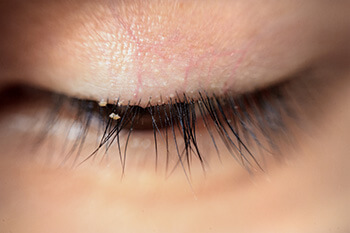What is Blepharitis?
 Blepharitis results from over activity of the oil glands in the eyelids surrounding our eyes. Allergy, dry eyes and eye make up may make the situation worse. Styes and chalazia are two conditions that stem from this same problem. Fair skinned, blue eyed people usually of northern European descent are most prone to the disease. Rosacea which is a form of adult onset acne on the cheeks and nose may be present as well. Keep in mind that in many cases it is not known why some people have blepharitis.
Blepharitis results from over activity of the oil glands in the eyelids surrounding our eyes. Allergy, dry eyes and eye make up may make the situation worse. Styes and chalazia are two conditions that stem from this same problem. Fair skinned, blue eyed people usually of northern European descent are most prone to the disease. Rosacea which is a form of adult onset acne on the cheeks and nose may be present as well. Keep in mind that in many cases it is not known why some people have blepharitis.
Problems that are associated with blepharitis include loose dandruff like flakes which are noted on the eyelashes, the eyelids sticking shut in the morning, and of course, irritation with red itchy eyes and eyelids, blurred vision, or a feeling that there is always something in the eye. In general, blepharitis is not the result of an infection, is not contagious and it can be controlled.
How is Blepharitis Treated?
There is no complete cure for blepharitis. Once you have had an episode of this, you will continue to have it off and on for the rest of your life. The irritation tends to be seasonal with Spring and Fall being the worst times. The key to treatment is control, so that the number of episodes you experience is minimized.
The first and by far the most important part of the treatment is to do regular eyelid cleansing to prevent oil buildup at the base of the eyelashes. This is done by taking a face cloth, wetting it with warm water mixed with baby shampoo or another mild soap (full strength). The eyelashes and eyelids are then gently cleansed for 20 or so seconds twice a day. It is important to use soap without perfume so that this lid hygiene process does not cause further irritation.
An antibiotic ointment such as Polysporin can be applied at bedtime to the eyelids where the lashes come out. This may help with the problem by softening the oil deposits and reducing bacteria on the eyelids which can worsen the irritation. The ointment should be used when the irritation is particularly severe or persistent, but it does not substitute for eyelid cleansing which should be done on a regular basis. Treatment should continue for several weeks without interruption and then can be used intermittently as needed.
Flax seed oil taken by mouth once or twice daily has been shown to help control blepharitis and reduce the annoying symptoms. The omega 3 oils tend to thin out the oily secretions from the eyelids and allow the surface of the irritated eye to mend itself.
Can Blepharitis Permanently Affect my Vision?
Rarely, blepharitis can be more serious and could even result in permanent effects on your vision. Regular care for your eyes including follow-up visits as indicated are quite important. Remember that there is no magic cure for this annoying problem which is quite common. Control requires diligent work on your part on a regular basis.

 (603) 524-2020
(603) 524-2020 Order Contact Lenses
Order Contact Lenses Pay Your Bill Online
Pay Your Bill Online



